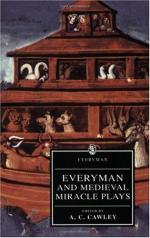
|
| Name: _________________________ | Period: ___________________ |
This test consists of 5 short answer questions, 10 short essay questions, and 1 (of 3) essay topics.
Short Answer Questions
1. What is the first shepherd complaining about at the opening of Scene I? ("The Second Shepherds' Pageant")
2. At the opening of Scene II, what does Satan tell Eve he was? ("The Fall of Man")
3. According to the introduction, what were the pageants in the book chosen for?
4. To what beast does the second shepherd compare his own wife? ("The Second Shepherds' Pageant")
5. What does the Messenger tell the soldiers put on ? ("Herod the Great")
Short Essay Questions
1. What does the introduction to "The Annunciation" state as its origin?
2. Why is the story of Mak included in this pageant?
3. From where did the editor obtain a copy of the manuscript to include "The Annunciation" in his collection of pageants?
4. How is the character of Noah's wife, as depicted in the pageants, different from the orthodox theological idea of her?
5. What does the Messenger say to prove Herod's power?
6. What error did Cawley correct in his Preface to the second edition of the text?
7. On what is the "Second Shepherds' Pageant" based?
8. What "justifies" Lucifer's fall from Heaven?
9. How are the "Shepherds' Pageants" distinguished from the rest of the Towneley cycle?
10. What does the editor state as interesting facts that surround "The Annunication"?
Essay Topics
Write an essay for ONE of the following topics:
Essay Topic 1
Based upon the play "Everyman", why should mankind live their lives in the most moral way possible? (i.e., What did Everyman come up against during his travels, therefore what does mankind need to prepare for?)
Essay Topic 2
In "Everyman", everyman asks many of his "qualities" to accompany him upon his journey. Why were each of his "qualities" disqualified from accompanying him? Which quality was able to accompany him on his journey? Why?
Essay Topic 3
Choose one of the "Medieval Miracle Plays" and compare and contrast the message that it contains to a similar message in Everyman. What are both texts trying to say? How do both texts deliver the message? Given that both texts obviously convey the same message, or it would not have been chosen for this essay, how do the texts differ? How are they similar?
|
This section contains 824 words (approx. 3 pages at 300 words per page) |

|




